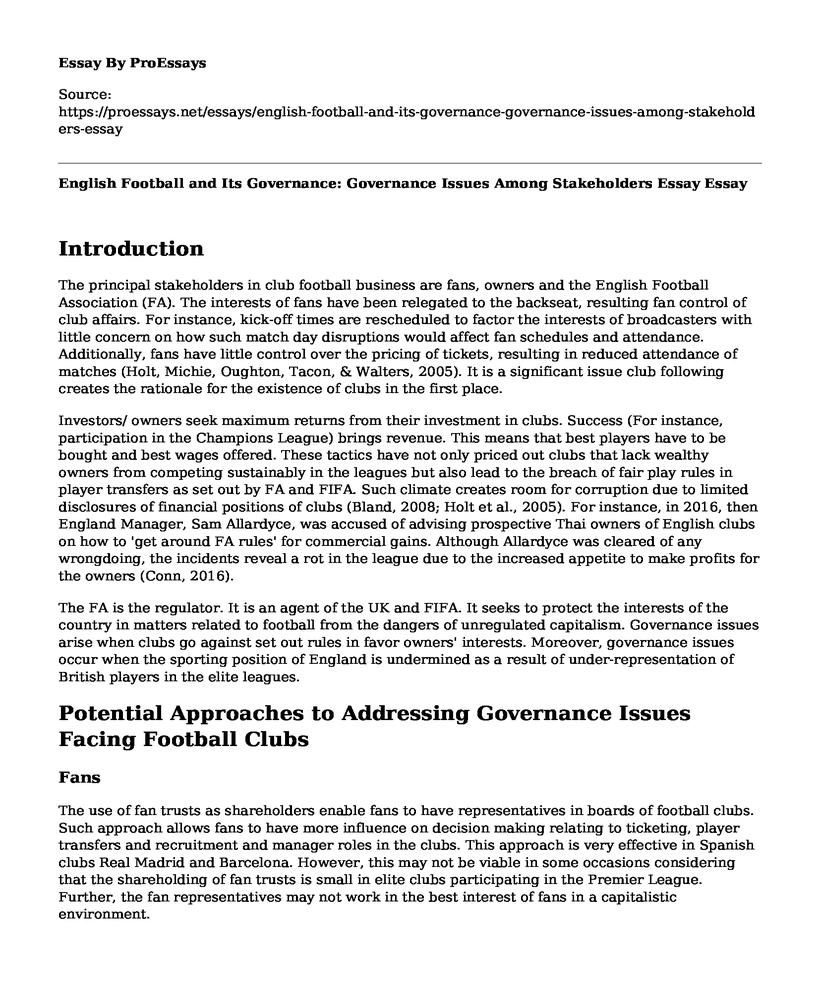Introduction
The principal stakeholders in club football business are fans, owners and the English Football Association (FA). The interests of fans have been relegated to the backseat, resulting fan control of club affairs. For instance, kick-off times are rescheduled to factor the interests of broadcasters with little concern on how such match day disruptions would affect fan schedules and attendance. Additionally, fans have little control over the pricing of tickets, resulting in reduced attendance of matches (Holt, Michie, Oughton, Tacon, & Walters, 2005). It is a significant issue club following creates the rationale for the existence of clubs in the first place.
Investors/ owners seek maximum returns from their investment in clubs. Success (For instance, participation in the Champions League) brings revenue. This means that best players have to be bought and best wages offered. These tactics have not only priced out clubs that lack wealthy owners from competing sustainably in the leagues but also lead to the breach of fair play rules in player transfers as set out by FA and FIFA. Such climate creates room for corruption due to limited disclosures of financial positions of clubs (Bland, 2008; Holt et al., 2005). For instance, in 2016, then England Manager, Sam Allardyce, was accused of advising prospective Thai owners of English clubs on how to 'get around FA rules' for commercial gains. Although Allardyce was cleared of any wrongdoing, the incidents reveal a rot in the league due to the increased appetite to make profits for the owners (Conn, 2016).
The FA is the regulator. It is an agent of the UK and FIFA. It seeks to protect the interests of the country in matters related to football from the dangers of unregulated capitalism. Governance issues arise when clubs go against set out rules in favor owners' interests. Moreover, governance issues occur when the sporting position of England is undermined as a result of under-representation of British players in the elite leagues.
Potential Approaches to Addressing Governance Issues Facing Football Clubs
Fans
The use of fan trusts as shareholders enable fans to have representatives in boards of football clubs. Such approach allows fans to have more influence on decision making relating to ticketing, player transfers and recruitment and manager roles in the clubs. This approach is very effective in Spanish clubs Real Madrid and Barcelona. However, this may not be viable in some occasions considering that the shareholding of fan trusts is small in elite clubs participating in the Premier League. Further, the fan representatives may not work in the best interest of fans in a capitalistic environment.
Corporate social responsibility (CSR) activities address issues such as unemployment and drug abuse in local communities. Others use CSR to tap talent from their localities thereby enhancing local support. Although these are good initiatives, they fail to address the issue of expensive tickets and reschedules of matches which affect fans directly.
Safeguarding Owners' Interests
The British government launched mechanisms to vet owners to ensure investors of integrity are admitted into the UK. Application of this approach can ensure that people with long-term interests in the sport are accepted as investors (All parliamentary Football Groups, 2009). This approach is weak in the sense that it would not resolve the governance issues brought about by the vagaries of capitalism especially concerning the interests of fans. An approach that balances the long-term interests of the club and that of the investors can offer a viable solution to investor issues in the clubs.
The UK as a Country Represented by the FA
Nurturing of local talent can be instrumental in increasing representation of British players in elite clubs. The quota system, for instance, can be effective as domestic players would get the chance to play against the best players in the world which is critical for their skills development. For instance, the success of Germany and Spain in regional and global football competitions in the last decade can be attributed to high representation of domestic players in the countries' successful clubs (All parliamentary Football Groups, 2009). In other words, the high number of domestic players in Bayan Munich and Borussia Dortmund clubs explains Germany's success; also the high representation of Spanish players in Barcelona, Real Madrid and Athletic Madrid explains the dominance of Spain in global football. Therefore, this is a viable approach pursued by the stakeholders.
References
All parliamentary Football groups. 2009. English football and its governance, April: http://www.allpartyfootball.com
Bland .B.(2008, April 7). Listed football clubs score own goals. Daily Telegraph. London
Conn, D. (2016, November 8). The sorry case of Sammy Lee, Sam Allardyce and FA double standards. The Guardian .London.
Holt, M., Michie. J., Oughton. C., Tacon. R and Walters. G. (2005). The state of the Game: the corporate governance of football clubs 2005. London: Football Governance Research Centre, Birkbeck, University of London.
Cite this page
English Football and Its Governance: Governance Issues Among Stakeholders Essay. (2022, May 09). Retrieved from https://proessays.net/essays/english-football-and-its-governance-governance-issues-among-stakeholders-essay
If you are the original author of this essay and no longer wish to have it published on the ProEssays website, please click below to request its removal:
- Essay on Continuum Change in Corporate Philosophies
- Paper Example on Team Building Exercise
- Paper Example on Strategic Planning in the External Environment
- Review of Dragon's Breath LLC Qualifications Paper Example
- Essay Sample on Pinto's Fires Case
- World Customs Organization - Essay Sample
- Essay Sample on Organizational Transformation: Strategies for Success







